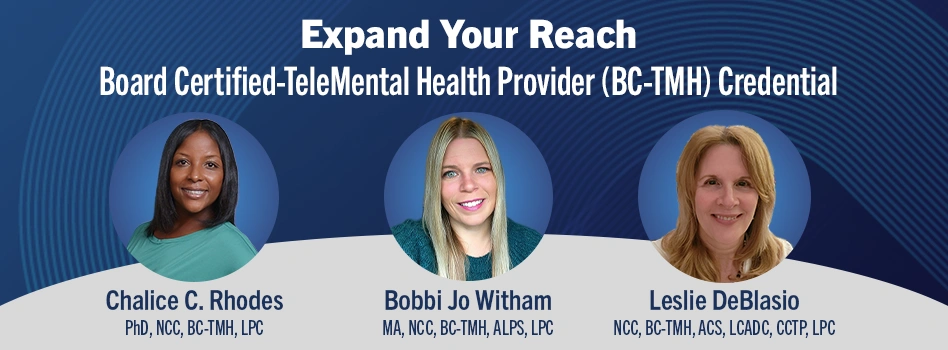
Telemental health services have expanded the reach of counselors and improved access to care for individuals who are in need across the country. What felt like a new experience to some of us a few years ago has now become the preferred method of providing care for many counselors and clients, and the demand for online services continues to grow rapidly.
In a 2020 survey by the American Psychological Association (APA), 92% of clinicians reported offering telehealth services, and 76% said they only counseled clients online. An earlier study showed that only 20% of those surveyed provided virtual care before the pandemic.
Chalice C. Rhodes, PhD, NCC, BC-TMH, LPC, is a psychosocial cancer/oncology behavioral health specialist in New Jersey who earned the credential in 2020.
“I decided to obtain the BC-TMH credential to increase my knowledge and awareness regarding the complexities of telemental health practice,” Dr. Rhodes says. “The BC-TMH credential has helped me to deliver ethically sound and competent treatment, and it has also provided me with the best practices for clinical care, which has supported me in offering a high-quality standard of care.”
To be eligible for the BC-TMH, candidates must either hold a current, active National Certified Counselor (NCC) certification or a current, active qualifying license to practice in a behavioral health field in the state or country where they live or work. Associates and interns under supervised practice also qualify as long as they are complying with their practice limitations. Candidates must also complete the required course content with one of CCE’s Registered Credential Training Providers (RCTPs), who have been approved to offer the curriculum and teach candidates the best practices to offer safe and effective services, and they must pass the TeleMental Health Examination (TMHE).
Bobbi Jo Witham, MA, NCC, BC-TMH, ALPS, LPC, of Washington, Pennsylvania, earned the BC-TMH in 2020.
“I decided to get the BC-TMH early in the pandemic when I was working for a university counseling center, and we had to quickly pivot to providing telehealth services. I wanted to make sure I was providing the best services for people in this new environment,” she says. “Until then, I had no experience or training with this. The credential helped me feel confident and provide a high level of services in the midst of all of the changes. I also feel like our field has changed so much, and this credential has helped me stay up to date on the best practices in telehealth.”
Leslie DeBlasio, NCC, BC-TMH, ACS, LCADC, CCTP, LPC, owner of Pathways to Healing Counseling in New Jersey, obtained the credential in 2022.
“I decided to obtain my BC-TMH because I think that the credential demonstrates that a provider has obtained the necessary knowledge, training, and proficiency to offer client telehealth services safely, ethically, and according to best practices,” DeBlasio says. “I think it’s super important for providers to demonstrate expertise in all aspects of service delivery, and I wanted to ensure that I learned all that I could about essential aspects of telehealth delivery to protect both my clients and my professional license. Additionally, when clients who have never had virtual services for therapy learn that I am board certified in telehealth, this provides assurance that they are working with a provider who takes care delivery very seriously.”
Counselors interested in the BC-TMH can learn more about the credential on CCE’s website.